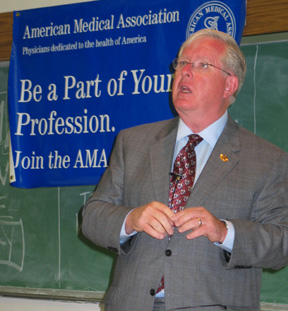 Compensation for patients’ “pain and suffering” should be limited in medical malpractice cases, the president-elect of the American Medical Association said Wednesday.
Compensation for patients’ “pain and suffering” should be limited in medical malpractice cases, the president-elect of the American Medical Association said Wednesday.
“There must be a limit on the non-economic damages,” said John Nelson, M.D., who will take over as president of the AMA in December. “The liability system is broken. It must be fixed.”
Dr. Nelson, an obstetrician-gynecologist from Salt Lake City, made his comments to UNMC faculty, residents and medical students during a noon presentation on Wednesday. During his visit to UNMC, he also met with Chancellor Harold M. Maurer, M.D., and College of Medicine Dean James O. Armitage, M.D., and he toured The Lied Transplant Center and the automated clinical laboratory at The Nebraska Medical Center.
Dr. Nelson said that 1,100 physicians left the state of Pennsylvania last year because they couldn’t get or afford liability insurance. In Texas, 75 percent of damages for victorious plaintiffs in medical negligence cases were awarded for “pain and suffering.” He said the AMA agrees it should pay for actual expenses incurred as result of the medical negligence, but that non-economic damages should be capped at $250,000.
“Ten U.S. senators are blocking what 72 percent of Americans want, and that’s liability reform,” Dr. Nelson said.
In addition, he commented briefly on assessment exams for licensure, resident work hours and medical school costs.
- He said the AMA is opposed to a proposed Clinical Skills Assessment Exam (CSAE). Beginning in 2004, medical graduates will need to take the CSAE for licensure. The exam’s cost is expected to be nearly $1,000, and Chicago will be the nearest testing site to Nebraska.
“We think the test is a bad idea. We don’t think another test is necessary, and there’s no evidence that it’s necessary or it makes a difference,” Dr. Nelson said.
The National Board of Medical Examiners and the Federation of State Medical Boards (FSMB) have approved the CSAE.
- Dr. Nelson said he and the AMA support limiting the number of resident work hours to 80 per week.
“As good as you are and as smart as you are, after a certain amount of time, sleep deprivation does not do us well, and it doesn’t do our patients any good,” he said. “The bottom line is the care of our patients. That’s what’s most important.”
- Dr. Nelson said it’s too expensive to go to medical school.
“We’ve got to figure out a way to make it less expensive,” he said. “Being in debt more than $100,000 is not pleasant.”